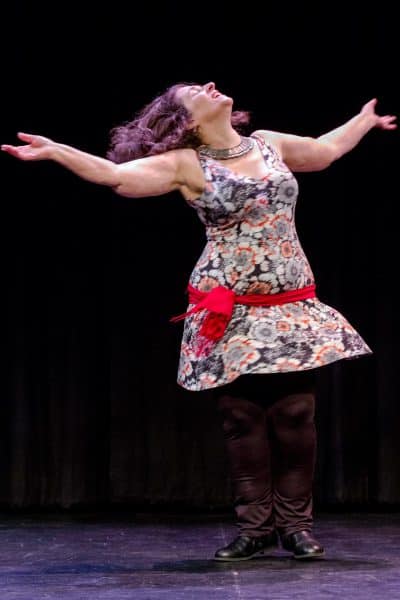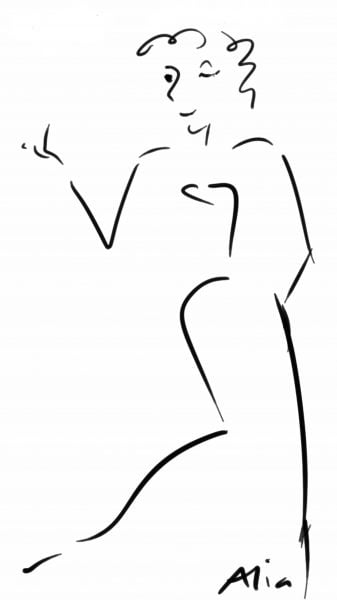
This is one of the questions I hear most often, and with the most anguish.
One dancer struggles as another effortlessly repeats. Why?
I learned to dance through improvisation. In Bobby Farrah’s classes of the mid 70s, no matter how many times a week you went to class (and I often went three times a week for two hours at a time, 1973-1977), we did something completely different.
The format of each class was fairly consistent: there was usually an extended combination, moves across the floor, and often we followed him as he improvised. Cymbal class was much the same, with zils on.
However, the content varied widely–what we did was always new and different, class after class, week after week. I learned to dance, very quickly, and with a wide range of options. I learned how to use a stage, how to interpret music, and how to create on the spot.
However, I did not learn any choreography. Consequently, when I started attending workshops (Morocco’s was my first), and even Bobby’s later classes, I was at sea. I quickly developed a strategy of not giving a damn about the choreography, just cherry-picking steps, attitudes and some combinations, and I was happy with this. But I did feel stupid when I saw other people learn so fast. On the other hand, I usually didn’t like their dancing, so I just snobbed over this little problem.
Then my students wanted me to teach them choreographies. Okay. I had been exposed to enough of them. I started making dances for my students. I went to more workshops where there was nothing presented but choreographies. I watched movies such as A Chorus Line and saw that professional dancers could repeat complex combinations after seeing them ONCE. And I paid attention to the differences in values between oriental dance and western dance. And this is what I saw.
In traditional Oriental dance, the dancer creates the dance in the moment. Oriental dance values intuitive movement and expression of emotion. Technique is the servant of expression. The most important thing is the feeling. These are the values of the music as well.
Western dance, however, distinguishes between the dancer and the choreographer (even that word is hard to type!). Dancers are trained to remember and repeat. Movement is stylized, specific, and exact. So are movement strings. The dancer is the vessel for the vision of the choreographer. The dancer’s job is to manifest that vision physically. So how do these dancers remember all that choreography?
Dancers remember choreographies because they practice. It’s as simple as that. What do they practice? Remembering choreography. In the dance school setup, children as young as three begin this practice. They go to class and learn choreographies. Their parents buy the cute (expensive) little cossies and have pictures taken, while their babies go on stage at the annual recital and toddle charmingly through their steps.
By high school, these kids have practiced this at least 800 hours (an hour a week for 15 years), repeating precisely stylized movement, combinations, and choreography. If they are at all enthusiastic, they go more often than once a week, and they practice at home, too, running through their choreographies endless times, not only with their bodies, but in their heads. They have gone to dance camp, this camp, that festival, the other workshop, spending many, many hours a day honing their technique and learning to repeat. We could be talking thousands of hours of practice here.
How much time have the rest of us spent? Learning to remember choreography? Not dancing, not improvising, not creating dances. Remembering. Probably we looked that other dancer and just felt stupid. Then we gave up, and said, I’m not good at learning choreography. I’m stupid. I’m slow. At that point, Resistance’s work is done. We have given up. And even though we struggle, we know it’s no good, because we compare ourselves to the other.
But I bet you have spent quite a few hours practicing other aspects of your dance. And I bet there are even more things you never thought about practicing, things that would have a much bigger impact on the quality of your dance than remembering choreography. Like being in the moment. Loving the audience. Enjoying yourself onstage. Laughing at your mistakes. Developing your emotional response to the music.
We do much better at whatever we practice. So if we practice feeling sorry for ourselves because some little twerp has a better memory for choreo, we will get better at feeling sorry for ourselves. But it doesn’t have to be this way.
Talent is Overrated by Shawn Colvin speaks to this.
Colvin’s premise is that much of what we think of as inborn talent is in fact the result of effort and practice. He tells the story of SF, an otherwise unremarkable guy, who learned through 250 hours of training to be able to repeat a string of 80+ numbers, no small feat. Prior to this, memorization and repetition of such long strings were thought to be outside the range of human ability. A pal of SF’s later went on to repeat a string of 102 numbers. The researchers concluded that there was no upward limit to the length of number strings that humans could remember. 250 hours is not a big investment to change the course of history.
Colvin mentions “retrieval structures,” one of the most important elements of memory development.
These are the strategies we use to remember things. SF cast his numbers into groups that represented running times. We will create choreographies with rich structures so that we will have myriad retrieval strategies in place. And we know that intelligence is malleable and can be grown, that anyone can develop skills with practice. So we can use the techniques of deliberate practice to learn whatever we want more effectively.
We may never put in the hours to learn choreo in one click. But as Colvin reports, ability in one area has nothing to do with ability in others. Sf could only remember numbers. Chess masters could only remember games. So don’t waste time comparing yourself to others. You have much better uses for your time.
Ask yourself, what makes a great dancer? Is it remembering choreography? I didn’t think so. Make a list. Leverage the skills you have. Leverage your ability to learn new things.
Where do you want to excel?
Practice that.
Want more?
Subscribe!






2 Comments
today at ballet rehearsal i was told there would be auditions for parts in the spring. and that it would bemore modern and hippy than the nutcracker we are currently rehearsing. part of me felt motivated to practice like crazy and (lose weight) and give whoever else is trying out a run for their money and get an understudy part. but…. more than 250 hours would be required. so much to give up. parties, hanging out with friends, working late to get that important project done, cooking thanksgiving dinner for the family, writing poetry…snuggling with hubby, writing postcards, participating at church, taking my brother lunch, visiting my grandbaby. am i willing? do i want it that badly? probably not. i do believe that the age of my brain impacts things – motivation and other things as well.
Yes, there sure comes a point where some things aren’t worth the hassle. Motivation counts for a lot. It’s nice to have the space to pick and choose.